Passenger Rail Travel and Tourism in Our Mountain Towns and Rural Communities
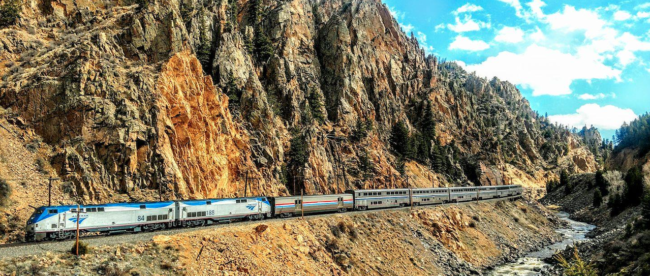
Trains Offer Economic Spending and Low Carbon, Low Impact Footprints
by Juan Alberto DelaRoca
An innovative and bold vision around sustainable community development and growth is emerging in a most unlikely place. The southern Front Range, specifically the mountain town of Trinidad, Colorado.
Trinidad is poised to become a leader in recreation and a tourism destination. An increase in Colorado’s population led by urban to rural flight, along with the explosive popularity of outdoor recreation and tourism related activities is driving a greater number of residents and visitors to “explore more” of the state.
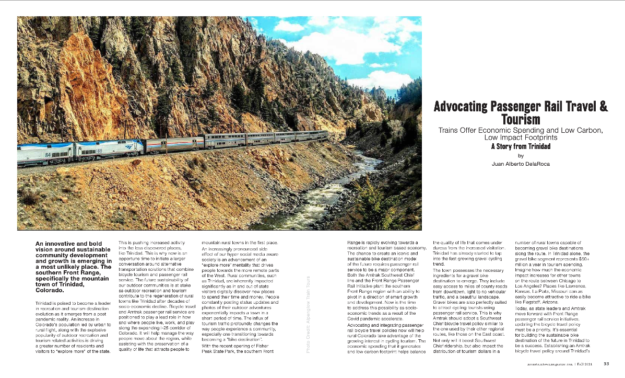
This is pushing increased activity into the less discovered places, like Trinidad. This is why now is an opportune time to initiate a larger conversation around alternative transportation solutions that combine bicycle tourism and passenger rail service. The future sustainability of our outdoor communities is at stake as outdoor recreation and tourism contribute to the regeneration of rural towns like Trinidad after decades of socio-economic decline. Bicycle travel and Amtrak passenger rail service are positioned to play a lead role in how and where people live, work, and play along the expanding I-25 corridor of Colorado. It will help manage the way people move about the region, while assisting with the preservation of a quality of life that attracts people to mountain rural towns in the first place.
An increasingly pronounced side effect of our hyper social media aware society is an advancement of an “explore more” mentality that drives people towards the more remote parts of the West. Rural communities, such as Trinidad, are inherently impacted significantly as in and out of state visitors digitally discover new places to spend their time and money. People constantly posting status updates and photos of their outdoor adventures exponentially impacts a town in a short period of time. The influx of tourism traffic profoundly changes the way people experience a community, especially one transitioning towards becoming a “bike destination”.
With the opening of Fisher Peak State Park, the southern Front Range is rapidly evolving towards a recreation and tourism based economy. The chance to create an iconic and sustainable bike destination model of the future requires passenger rail service to be a major component. Both the Amtrak Southwest Chief line and the Front Range Passenger Rail Initiative plant the southern Front Range region with an ability to pivot in a direction of smart growth and development. Now is the time to address this possibility as socio-economic trends as a result of the Covid pandemic accelerate.
Advocating and integrating passenger rail bicycle travel policies now will help rural Colorado take advantage of the growing interest in cycling tourism. The economic spending that it generates and low carbon footprint helps balance the quality of life that comes under duress from the increased visitation. Trinidad has already started to tap into the fast growing gravel cycling trend.
The town possesses the necessary ingredients for a gravel bike destination to emerge. They include easy access to miles of county roads from downtown, light to no vehicular traffic, and a beautiful landscape. Gravel bikes are also perfectly suited to attract cycling tourists using passenger rail service. This is why Amtrak should adopt a Southwest Chief bicycle travel policy similar to the one used by their other regional routes, like those on the East coast.
Not only will it boost Southwest Chief ridership, but also impact the distribution of tourism dollars in a number of rural towns capable of becoming gravel bike destinations along the route. In Trinidad alone, the gravel bike segment represents $50+ million a year in tourism spending. Imagine how much the economic impact increases for other towns on the route between Chicago to Los Angeles? Places like Lawrence, Kansas, La Plata, Missouri can as easily become attractive to ride a bike like Flagstaff, Arizona.
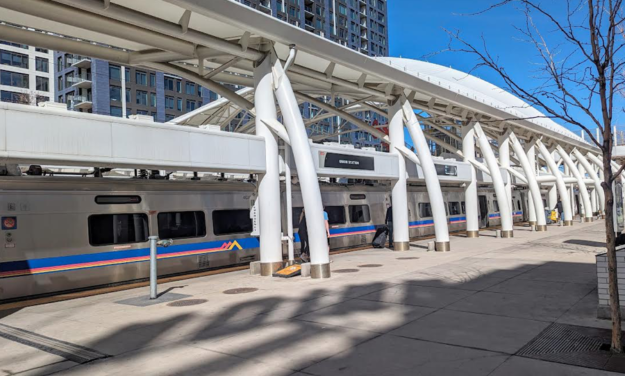
Today, as state leaders and Amtrak move forward with Front Range passenger rail service initiatives, updating the bicycle travel policy must be a priority. It’s essential for building the sustainable bike destination of the future in Trinidad to be a success. Establishing an Amtrak bicycle travel policy around Trinidad’s efforts provides a blueprint that is exportable to other rural communities seeking to diversify they’re economic base by attracting new residents and visitors through outdoor recreation and tourism. The Colorado-New Mexico portion of the Southwest Chief line represents a nexus point. Updating the Amtrak bicycle travel policy immediately benefits both Trinidad (Colorado) and Raton (New Mexico), especially with Fisher Peak State Park situated between them. What if passenger rail even created a means of accessing the park itself? A setting where you could access the trail system at the top of Raton Pass and ride into either town?
Not only does passenger rail service bring recreation based tourism dollars to the southern Front Range, but it also addresses increased automobile traffic on the local road network. Part of the alternative transportation opportunity is to provide a solution for the millions of residents and visitors who pass through Colorado’s second busiest port of entry. Implementing an enhanced bicycle travel policy on the Amtrak Southwest Chief helps ensure Trinidad is able to maintain an old west inspired adventure travel experience. A destination where one still sees the stars in the night sky. Where you are still lucky enough to run into wildlife on a carless bike ride. Future Front Range passenger rail service, starting with the Amtrak Southwest Chief, has the ability to influence how we introduce future generations of outdoor recreation enthusiasts to the wild places quickly disappearing under the intense pressures of growth and development. Updating the Amtrak Southwest Chief bicycle travel policy has a rippling effect beyond the economics of cycling tourism. It can direct and push the urban “explore more” mindset towards sustainable travel behaviors into rural areas. What if we had more people posting photos of themselves riding the train to and from a travel destination?
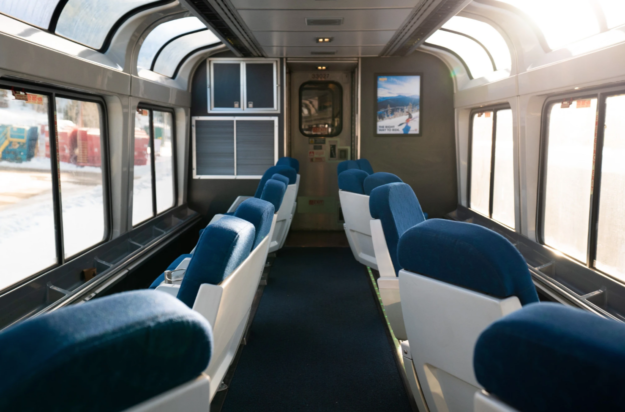
The current Amtrak policy states travel with a bicycle on the Southwest Chief is allowed, however with limitations. You can only embark and disembark with a bicycle at designated stops, which are in no way convenient to those interested in using the service. Not making every stop accessible to bicycle travel hinders the ability for Amtrak to increase cycling tourist ridership on the Southwest Chief, which in turn hinders the spending of money in the rural places that need it most right now. The demand for passenger rail service for planning a cycling travel experience exists. A short survey shared with cyclists asked one simple question. “If a train were an option, would you consider using it for traveling to your next destination town?” Out of 100 responses, 95 answered yes. Denying bicycle travel on the train between Trinidad and Raton is holding back the opportunity to create a sustainable bike destination. Modernizing the Amtrak Southwest Chief bicycle travel policy at the Colorado-New Mexico border improves everyone’s bottom line, especially as Amtrak begins to introduce new long distance trains.
There are precedents of integrating bicycle travel into alternative transportation solutions already. Buses and trains are already available to cyclists to explore more of the urban Front Range corridor. Many years ago, I was first introduced to the RTD bus between Boulder-Nederland with a mountain bike experience. The idea of loading a bike onto the bus and traveling 30 minutes west and riding back to Boulder changed my personal approach to cycling.
Later, I applied this insight while living in Denver. Light Rail became a resource for accessing the trail networks at Green Mountain, Matthew Winters, and Apex before riding back to my Denver North neighborhood. Proving the point further is the adoption of passenger rail in accessing recreation activities is the Denver Winter Park Express train. It’s popularity demonstrates why an improved Amtrak Southwest Chief bicycle travel policy can work in southern Colorado. Taos Ski Valley founder Ernie Blake also recognized the business benefits of passenger trains. It played a major role in targeting urban Chicago residents interested in the New Mexico ski experience. Now this same visionary thinking is needed as Trinidad and Raton move towards an outdoor recreation and tourism based economy. Passenger rail service helps create the sustainable and iconic bike destination these towns must become as people “explore more” of the west.
Amtrak has threatened to eliminate the Southwest Chief line a number of times in the past. Fortunately, the rural communities of Kansas, Colorado, and New Mexico, at the behest of political leaders, came together and saved it’s demise. This is why the Southwest Chief & Front Range Passenger Rail Commission came into existence. Now it can help connect the historically isolated southern Front Range to more people from not only Colorado, but the Midwest and West Coast. Passenger rail from Fort Collins, Denver, Colorado Springs, and Pueblo not only enhances where residents travel to live, work, and play in the state, but also expands the reach and impact visitors have on the region’s recreation and tourism economy. Establishing an improved Amtrak bicycle travel policy on the train has a cascading long term effect on local business because it promotes activity in the downtown core of a community.
Trinidad and Raton are squarely on the path to becoming a popular recreation and tourism destination. Fishers Peak and the 19,200 acres between them will be one of the most digitally photographed natural landmarks in the years ahead. A bicycle friendly corridor that rivals the distance from Aspen to Crested Butte is going to become a tourism draw in itself. Managing the flow of human traffic seeking to “explore more” needs an improved Amtrak bicycle travel policy before it becomes too late.
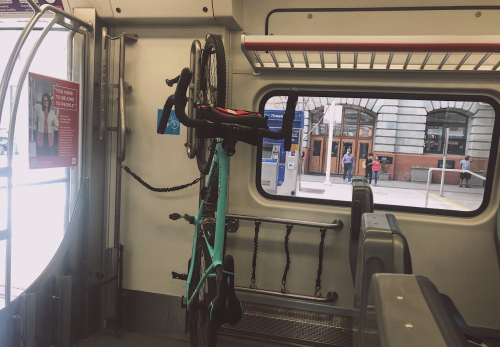
Utilizing passenger rail service to create an iconic and sustainable bike destination can be a unique feature to economic development simply because it has never been done anywhere in the world. The closest thing would be the mountain bike and gondola system used in the Sud Tirol region of Austria. The rail that crosses Raton Pass is capable of delivering the equivalent experience. Only without the need to install infrastructure like lift towers and service roads. The infrastructure is more or less in place already.
Improving access to the Colorado-New Mexico region through a bicycle travel policy that makes sense can propel Trinidad and other mountain town communities towards becoming world class bike destinations and serve as a model for other communities to emulate. The intense influx of population of the last twenty years is due largely in part to outdoor recreation and tourism. Throw in social media, the pandemic, and the strong demands of cycling tourism, and the rate of it hastens.
The need for building a southern Front Range bike destination that is iconic and sustainable is born out of the reality that inevitably development and growth out of Denver and Colorado Springs will continue to push further south as well as west in tandem with the urban to rural flight of 2021.
A simple tweak to the Amtrak Southwest Chief bicycle travel policy will help Trinidad, and inspire other rural towns, to capitalize on these trends. Everyone involved benefits. Amtrak increases ridership and millions of tourism spending helps revitalize communities after decades of decline, while also preserving the qualities that make them attractive.
Prioritizing and updating the bicycle train travel policy, starting with the Southwest Chief, is a simple action item for Amtrak and the Front Range Passenger Rail Commission to realize. A sound plan to systematize and promote a forward-thinking bicycle train travel policy will result in the creation of a sustainable travel destination like no other done before as the “explore more” mindset increasingly takes a stronger hold on the Front Range megaregion. Post pandemic life has provided us with a chance to hit the reset button, visualize, and build special travel destinations of the future.
Publishers Note:
As a child and teenager my prime vehicle of transportation was the train. I was able to move through my town by boarding the Long Island Railroad and disembarking a quick walk from a station to a friends house. When I left home for school I could travel by train from Rhode Island to New York in a safe, relaxed and clean train car. Pricing for students was very reasonable and it kept me off of clogged roads leading to these destinations. Bikes were not permitted then but that would have made travel and exploration even easier.
I now live in Breckenridge and I would be willing to travel to Kremmling to access the Front Range as well as the Western Slope. I understand their is an unmanned station in Granby but I feel that is a bit too far to travel by car to make the trip worthwhile. I fully advocate better stops for people to utilize what I see as an underutilized resource for transportation. Imagine grabbing a bag and your bike to head off into new places and outdoor spaces. I fully advocate Passenger Rail Travel and Tourism in our Mountain Towns and Rural Communities. Imagine leaving the I-70 Corridor and relaxing on a comfortable and scenic train ride to access more of Colorado and all of the United States.
^^^
Today, The League of American Bicyclists is supporting federal, state, and local actions to build a Bicycle Friendly America for Everyone. In their Action Center, you can find actions created by the League and state and local organizational members. By taking action you can be a part of building a Bicycle Friendly America for Everyone! Click this LINK to learn more!
~Holly Battista-Resignolo
For More Treks & Travel Ideas Head to this LINK
Story Sponsor
MTN Town Media Productions | Celebrating the Colorado mountain lifestyle for over 14 Years
Copyright 2024 MTN Town Media Productions all rights reserved.

